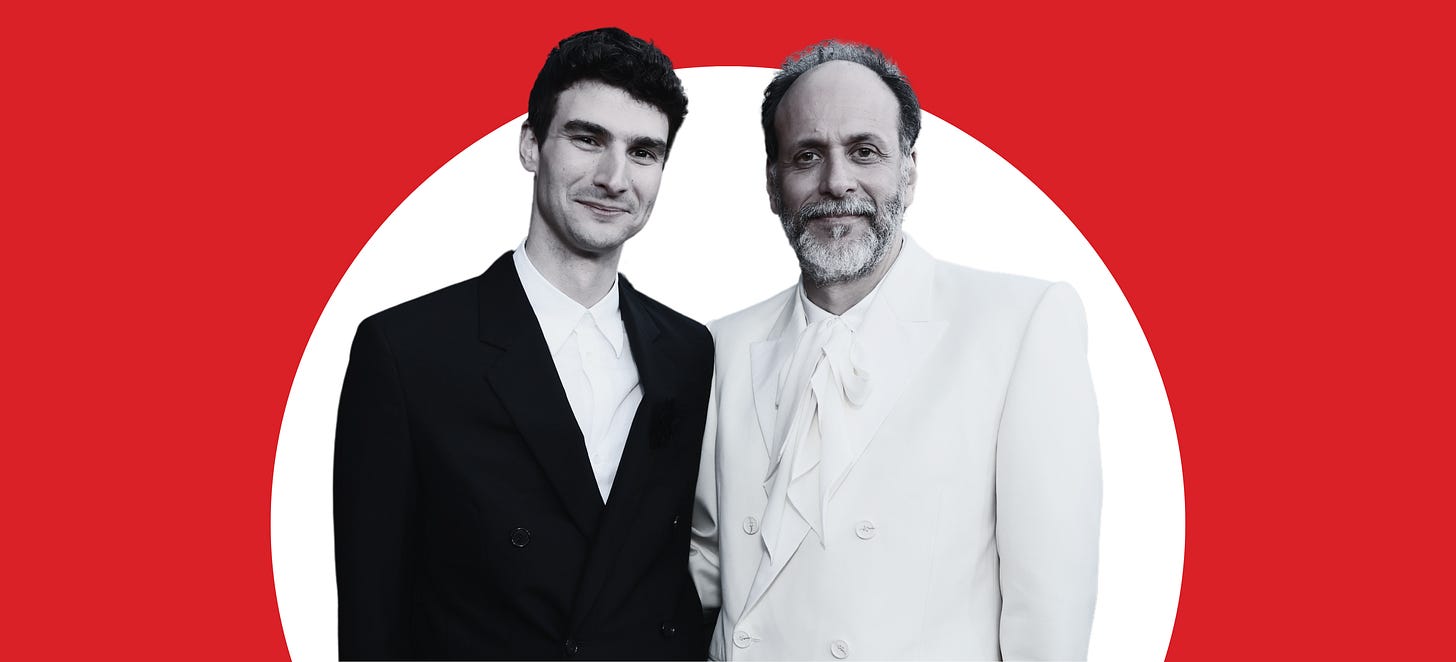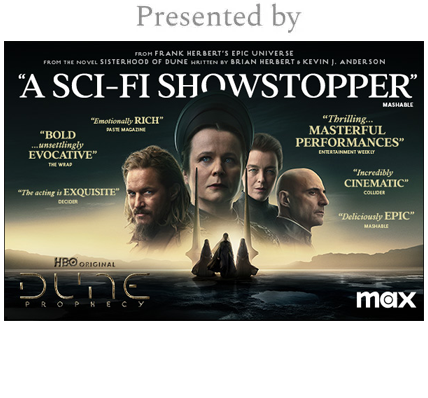First Draft to Film in 5 Months. Then Luca Guadagnino Asked for More
Serena Williams vs. Naomi Osaka inspired Justin Kuritzkes' spec script. Zendaya, 'Challengers' and a second movie with the director, 'Queer', followed

There’s barely a week to go until Christmas, and just a few days before things well and truly shut down for most until the New Year. (I, however, will have brand-new episodes of the Prestige Junkie podcast over the holiday for you as well as some bonuses, so please subscribe if you haven’t already and keep an eye out in your podcast feed.) Before any awards watchers and aspirants can take a break, though, most awards strategists I know are mostly sweating what happens tomorrow, Dec. 17, when the Oscars announce their shortlists in 10 different categories.
Later this week I’ll spend some time breaking down what we learn from those shortlists, and take a look at where our major best picture contenders stand as the year winds down. I’m not expecting a huge revelation like the one we had in 2022, when All Quiet on the Western Front showed up on so many technical category shortlists that it suddenly looked like a major best picture contender.
But in an Oscar race that’s still so wide open, any bit of evidence about what the actual Academy is thinking is priceless. With all due respect to the fine people of Critics Choice and everyone else who have shared their nominations over the past few weeks, the Oscar voters get the final word, and tomorrow we’ll finally get a sense of what they might say.
For today, though, I’m sharing a conversation I had a few weeks ago with someone who won’t be part of tomorrow’s shortlist drama (the screenplay categories aren’t among those with shortlists). But with two films to his name released in 2024, Justin Kuritzkes has a lot of rooting interest in this year’s Oscar race, as well as some advice on what happens when your dreams of becoming a screenwriter get very real very fast.
Challenge Accepted
Some people spend years developing a love-hate relationship with the movie business. Justin Kuritzkes was born with it.
A Los Angeles native and Harvard-Westlake graduate, Kuritzkes, 34, grew up surrounded by the children of Hollywood, even though his dad was a doctor and his mom a lawyer. “My love for film was in some ways a product of growing up there,” he says, “but also my aversion to the industry was a product of my growing up there.” (He spoke to me from his home in New York City, where he lives with his wife, Past Lives writer-director Celine Song.)

After graduating Brown, he launched himself into writing plays, as well as basically every storytelling format other than movies: Viral videos, an album called Songs About My Wife, a comic novel. He was in the middle of what he thought would become his second novel when a 2018 tennis match between Serena Williams and Naomi Osaka caught his attention and changed his life.
Inspired by that match, one that seemed to reveal the emotional intensity of the world of tennis, Kuritzkes wrote Challengers on spec. “I was just writing it because it was this movie that I really wanted to watch, and I could tell that the only way that it was going to become real was if I wrote it,” Kuritzkes says. At the time he was a successful playwright, but he acknowledges the limits of that profession. “The whole time I was a playwright,” he says, “I was writing on my tax forms that I was an administrative assistant and an SAT tutor.”

His script made it to Amy Pascal and then to Zendaya — who got Luca Guadagnino on board. “The space between when I wrote the first draft and when we were in pre-production was like five months,” he tells me, acknowledging that the speed of his pivot from financially struggling playwright to screenwriter sounds like a preposterous Hollywood fairy tale. “Everybody who was showing up to make it was showing up to make the movie I had written. I got really spoiled, but I was very conscious of the fact that that wasn’t the norm.”
Guadagnino Day and Night
Not that it’s any more normal for your second project to find you while you’re in the process of making the first one. Kuritzkes was on the set of Challengers in Boston when Guadagnino asked him to tackle a screen adaptation of the William S. Burroughs novel Queer, written in 1952 but not published until 1985, partly due to its, yes, explicitly queer content.
Famously thorny and not even finished by Burroughs, Queer is a tough assignment for any screenwriter, maybe particularly so for someone who had never taken on an adaptation before. But making a Guadagnino movie by day and writing another one by night may be the only way to do it.
“I was coming from set every day feeling very embedded in the way that Luca makes movies, and then going home and writing a script with that in mind,” Kuritzkes says. “I was writing scenes selfishly that I was excited to watch Luca direct because of this experience I was having with him.”
For all the ways Challengers is direct and propulsive like its ambitious athlete characters, Queer is dreamy and inventive, following Daniel Craig’s lonely expat Lee as he pursues a younger man, played by Drew Starkey, who may or may not be all that interested in him. Burroughs’s book spends time inside Lee’s mind as he imagines the relationship that might be; because Kuritzkes knew Guadagnino would be the one behind the camera, he felt emboldened to bring those scenes directly to the screen.
“I had the confidence, because I knew who I was writing it for, to just make that very literal in the script, and trust that Luca would not make it goofy, but would make it iconic,” he says. “It’s not a script I would write for anybody else.”
Breaking out with Challengers and Queer in a single year is an excellent indication of Kuritzkes’ range — one a contemporary, entirely original comedy, the other an adaptation of a rambling literary classic — as well as the many paths a screenplay can take toward reality. With a Critics Choice Award nomination for Challengers and upcoming collaborations with Austin Butler, Jude Law and Guadagnino again, Kuritzkes has found his way back to film, as he puts it, and he’s got a lot of stories still to bring to the screen.
So when your Hollywood dreams suddenly come true in the span of a single year, what do you do next? You keep going. As any writer knows, the same problems that plagued you last time you sat down at the keyboard are still there when you start over on the next thing.
Kuritzkes, the former SAT tutor and administrative assistant, is now a bona fide screenwriter, but he says, “I’m not dumb enough to think that that’s real or that that’s who I am.”
What he does have now, though, is not necessarily more confidence, but the knowledge that if he finished a script once, he can do it again. “It never gets easier, but what does get easier is that you have the knowledge that you felt exactly this way before, that it was exactly this hard the last time, and that somehow you got through it,” he says. “Everybody who’s ever finished anything at some point finished it without knowing that they could. And so that gets easier. But the actual writing, no. I keep dreaming about it just flowing out, but that doesn’t happen.”





